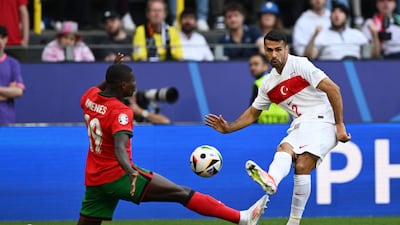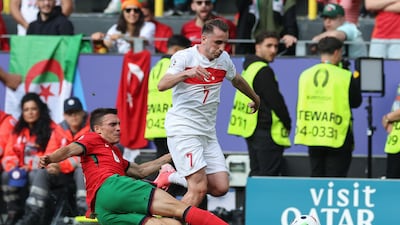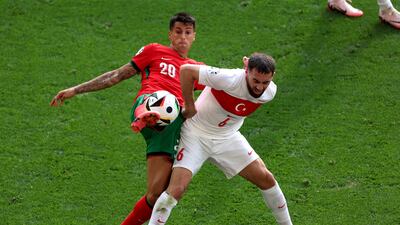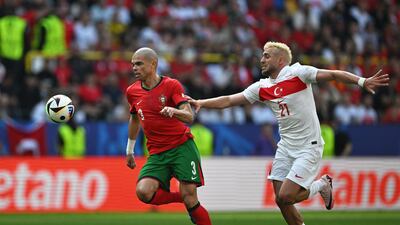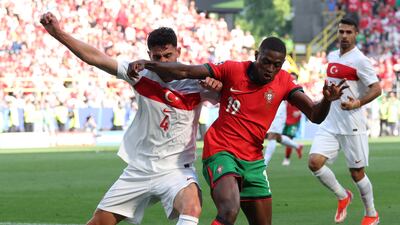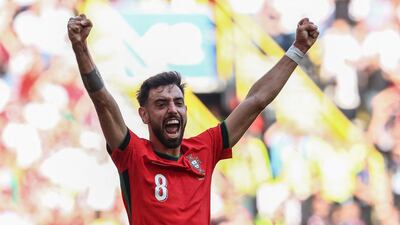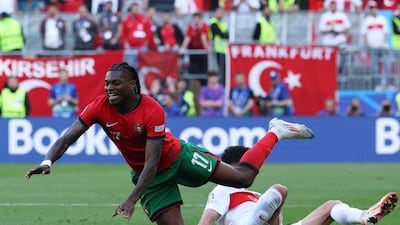As he nears the centre spot before kick off at Hamburg’s Volksparkstadion on Wednesday, Turkish pennant in his hand, palm extended to his rival captain and the referee, Hakan Calhanoglu might just pause for a moment to remember a moment of inspiration.
Just outside this very centre circle, Turkey’s captain scored a breathtaking goal they still talk about in Hamburg. He struck it from more than 40 metres from the target, and its flight path was so full of unexpected swerves and sudden dips it seemed to defy the laws of physics.
Calhangolu’s wonder strike, in a late-season Bundesliga fixture for Hamburg against Borussia Dortmund, announced his special skill with a dead ball to a wider world. In the decade since, Calhanoglu has become acknowledged as one of the game’s great virtuosos with free kicks and corners, and a masterly passer over ambitious distances, assets that have taken him a long way from Hamburg, where, as a 20-year-old he was often helping stave off relegation.
After he left – a fractious departure – the club struggled on through various battles against the drop but the arena Calhangolu revisits today, leading a Turkey anxious about their progress to the knockout stage of Euro 2024, has long become used to hosting club games in Germany’s second tier.
For Turkey-Czech Republic, a rousing atmosphere at the Volksparkstadion is guaranteed. Hamburg is home to the fourth highest urban concentration of Germans of Turkish heritage and, in a country where the community numbers an estimated seven million, support for the Crescent-Stars at the championship so far has been conspicuous.
Seldom has that community had such prominence at the top of the sport in both Turkey and Germany.
Calhanoglu, fresh from winning last season’s Italian league title with Inter Milan, was born in Mannheim, his parents having moved from Anatolia, to lend their skills to a German labour market that had been eagerly recruiting in Turkey from the 1960s onwards.
As it turned out, the family would also bequeath a great deal of future sporting talent to their adopted home. Hakan’s brother Muhammed has also pursued a professional football career; likewise his cousin, Kerim, who has represented Germany at various youth levels.
The same choice, Germany or Turkey, was open to Hakan Calhanoglu, whose creative passing and improvisation at Hamburg made him prized first by Bayer Leverkusen – beneficiaries of a contested transfer from Hamburg in the summer of 2014 – then AC Milan, and then Inter, where his adaptation to a deeper midfield role has advanced still further his reputation.
His stock in German club football remains high. Rumbling along in the background to the Euros is Bayern Munich’s sustained interest in luring Calhanoglu, now 30, back to the Bundesliga. Inter will only let him go for a very significant fee.
Meanwhile, the German national team have, over the past five or six years, had cause to regret Calhanoglu’s decision, taken in his teens, to represent the country of his heritage rather than his birth. They could have done with a passer like him.
Germany’s blessing is that Ilkay Gundogan, whose grandfather Ismail left Balikesir in Turkey to work as a miner in the Ruhr, did elect to play for his native country. The Barcelona and former Manchester City star is captaining the host nation at these Euros, leader of a squad that also includes Borussia Dortmund’s Emre Can and Deniz Undav, other footballers of Turkish heritage.
Among Calhanoglu’s Turkey teammates are the German-born quartet of Salih Ozcan, Kaan Ayhan, Cenk Tosun and the teenager Kenan Yildiz, also in Serie A with Juventus.
Turkey 0 Portugal 3 – player ratings
All of them follow in a distinguished line of Turkish-German players, many of whom confronted prejudice rising through the sport. Mesut Ozil, a stellar contributor to Germany’s World Cup triumph in 2014, retired from representing the country four years later with the observation that “I am a German when we win and an immigrant when we lose.” Ozil and Gundogan had been criticised by the German Football Federation for posing, in London in 2018, for a photograph with Turkish president Recep Tayyip Erdogan.
Ozil’s direct contemporary, Nuri Sahin, German-born but committed to Turkey, from youth level upwards and through more than 50 senior caps, encountered criticism within Germany for his choice of national jersey when he was a young midfielder, starring for Dortmund, and, like Ozil, later signing for Real Madrid.
Sahin, still only 35, remains a high-profile and pioneering figure in the sport – earlier this month, he was appointed new manager at Dortmund, second only to Bayern in the hierarchy of Germany’s best supported clubs and runners-up to Real Madrid, three weeks ago, in the Uefa Champions League.
For Calhanoglu, the task in the city he used to call home, will be to channel the noisy local backing that has accompanied Turkey through their group stage matches so far, and to re-establish the command his team showed in their opening 3-1 victory over Georgia.
An error-strewn 3-0 defeat to Portugal in their second match has left Turkey vulnerable going into matchday three. Defeat to the Czechs could mean an early exit. Avoiding defeat would guarantee second place, behind the Portuguese in Group F, and a last-16 game in Leipzig on Monday.
Turkey will be without the suspended Abdulkerim Bardakci in central defence, have a doubt over whether first-choice goalkeeper Mert Gunok, who missed the Portugal defeat with injury, will be ready to return. A good deal of attention will be cast on whether the Real Madrid starlet, Arda Guler, is included in the starting line-up. Guler, 19, struck a sensational goal to regain the lead against Georgia but was left out of the XI in the following fixture.
“I didn’t want to risk him for more than 30 minutes,” Turkey manager Vicenzo Montella explained, citing a light injury the striker had been carrying. Fans made it clear through the Portugal game they wanted to see Guler on the pitch for more than just his 20 minutes at the end, chasing a three-goal deficit.
“We have to look forward,” said Calhanoglu. “We gave away goals against Portugal but these things can happen. We need to focus now on getting second place in the group.”



